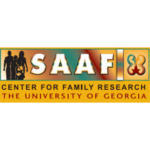Parent review feedback summary
- Parent reviewers found SAAFP to be beneficial to families, and believe it has the potential to make a big difference in the lives of families.
- Reviewers questioned why this program was specific to child welfare and thought it would be better suited as a community resource offered outside of child welfare. Although focused on preventing teen behaviors, reviewers felt this intervention is targeting youth and teen behaviors without addressing root causes (racism, environmental, and cultural factors that contribute to or exacerbate risky behaviors).
- One parent reviewer noted that the implementation of resources such as SAAFP must be wholly adopted by the agency and there must be a commitment from agency staff to continuously serve African American families, youth, and teens in a culturally sensitive way.
What is the intervention?
Strong African American Families Program (SAAF) is a 21-hour program developed by the Center for Family Research at the University of Georgia and African American families in rural Georgia. SAAF is designed for youth ages 10-14 and their caregivers and delivered across seven weekly sessions, where youth and families meet separately and together with trained group leaders. Topics explored in the seven sessions of the program include: goal setting, self-discovery, peer pressure, understanding parents, managing unfair situations motivated by racial discrimination, how to make friends, racial pride, expressing appreciation, staying connected as a family, academic success, and more.
Participation in the SAAF program leads to less maternal depression and higher positivity of racial identities for parents, as well as fewer conduct issues, reduced likelihood of using drugs, reduced depression, and delayed onset of sexual activity. Furthermore, SAAF provides tools and education to teens and parents to lead healthier lives. Additional outcomes included problem solving tactics for parents and teens, strategies to navigate discrimination, and increased academic engagement.
Diving into a rich set of topics, each of the seven sessions within the program act as a portal to vital aspects of personal and familial growth. Themes range from essential components such as goal setting, self-exploration, and navigating peer pressures to more profound discussions on understanding parental perspectives, coping with unfair situations arising from racial discrimination, nurturing friendships, fostering racial pride, expressing gratitude, fortifying familial bonds, optimizing academic success, and more.


What makes it a Bright Spot?
Resources specific to older youth are not as readily available as those for infants and elementary-aged children. Additionally, SAAF was designed with the culturally specific concerns facing African American families and children, particularly with racial discrimination, risk for substance use and risky sexual behavior at the forefront of the conversation. SAAF was designed in partnership with African American youth and teens as well as their caregivers, influencing the content of the program.
The benefits stemming from participation in SAAF unveil a constellation of positive outcomes for youth and parents. Parents engaged in the program showcase decreased levels of maternal depression while concurrently exhibiting heightened positivity toward racial identities. Youth outcomes show a reduction in conduct issues, decreased desire for substance use, mitigated instances of depression, and even a delayed onset of sexual activity.
What steps can you take?
- Recommit to black families your agency serves by starting a conversation with your colleagues and leadership about new ways to effectively connect with them.
- Find out how to purchase the program, and what goes into the training by visiting the SAAF Programs Site.
Downloadables
These downloadable resources may help provide additional context and information about this family-approved resource for systems change.
Let us know any information to consider adding to this Bright Spots practice.
Share this Bright Spot with a colleague
Have an idea?

